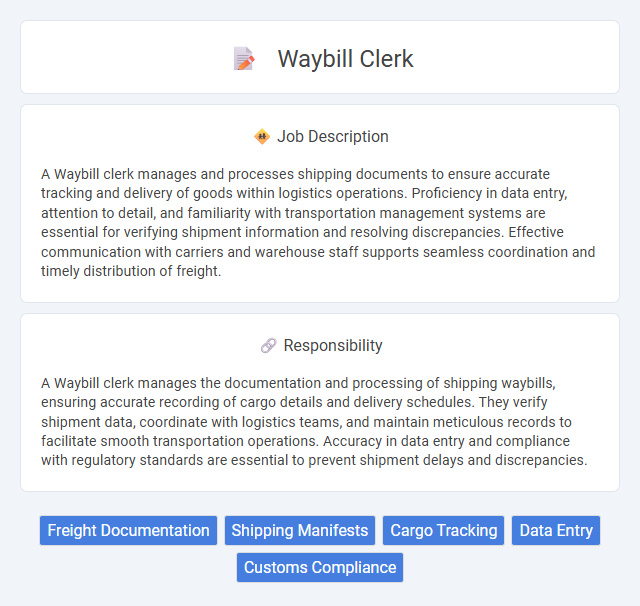
A Waybill clerk manages and processes shipping documents to ensure accurate tracking and delivery of goods within logistics operations. Proficiency in data entry, attention to detail, and familiarity with transportation management systems are essential for verifying shipment information and resolving discrepancies. Effective communication with carriers and warehouse staff supports seamless coordination and timely distribution of freight.
Individuals who possess strong organizational skills and attention to detail are likely to be well-suited for a Waybill Clerk role, as the job requires accurate handling of shipping documents. Those comfortable working in fast-paced environments and managing repetitive tasks may find this position compatible with their abilities. People who prefer minimal physical labor and enjoy clerical work might have a higher probability of thriving in this role.
Qualification
Waybill clerks require strong organizational skills and experience with logistics or shipping documentation to accurately prepare and process waybills. Proficiency in data entry, attention to detail, and familiarity with inventory management software are essential qualifications. A high school diploma or equivalent is typically required, while additional certifications in supply chain or logistics can enhance job prospects.
Responsibility
A Waybill clerk manages the documentation and processing of shipping waybills, ensuring accurate recording of cargo details and delivery schedules. They verify shipment data, coordinate with logistics teams, and maintain meticulous records to facilitate smooth transportation operations. Accuracy in data entry and compliance with regulatory standards are essential to prevent shipment delays and discrepancies.
Benefit
Waybill clerk jobs likely offer benefits such as enhanced organizational skills and increased attention to detail due to the nature of handling shipping documents. There is a probable improvement in understanding logistics and supply chain processes, which can boost career prospects in transportation and warehouse management. Employment in this role may also come with stable working hours and opportunities for professional growth within the shipping and logistics industry.
Challenge
A Waybill clerk job likely involves navigating the complexity of managing accurate shipment documentation amidst fast-paced logistics environments. The role probably demands strong attention to detail to prevent costly errors in cargo tracking and delivery schedules. Handling discrepancies between shipping data and actual shipments could present ongoing challenges requiring quick problem-solving skills.
Career Advancement
Waybill clerks develop expertise in shipping documentation and logistics coordination, which positions them for advancement into roles such as logistics coordinator, freight broker, or supply chain analyst. Mastery of inventory management software and regulatory compliance enhances career prospects within transportation and distribution companies. Progression often involves increased responsibility in managing shipments, negotiating with carriers, and optimizing supply chain efficiency.
Key Terms
Freight Documentation
Waybill clerks specialize in preparing and managing freight documentation essential for tracking shipments and ensuring accurate delivery processes. They verify shipment details, create bills of lading, and maintain records that comply with transportation regulations. Proficiency in logistics software and knowledge of industry standards streamline the handling of freight documentation, facilitating smooth supply chain operations.
Shipping Manifests
Waybill clerks handle crucial documentation for shipping manifests, ensuring accurate recording of cargo details, destination, and shipment schedules. Their role involves verifying data for compliance with transportation regulations and facilitating efficient logistics operations. Expertise in managing shipping manifests supports timely dispatch and receipt of goods, reducing errors and delays in supply chain processes.
Cargo Tracking
A Waybill clerk plays a crucial role in cargo tracking by accurately recording shipment details and updating tracking systems to ensure real-time visibility of goods in transit. This position requires meticulous attention to data entry, handling waybills, and liaising with logistics teams to monitor cargo status and resolve discrepancies. Efficient cargo tracking by a Waybill clerk enhances supply chain transparency, minimizes delivery delays, and supports accurate reporting for inventory management.
Data Entry
A Waybill clerk is responsible for accurately entering shipment and transportation data into logistics systems, ensuring that all waybill information is up-to-date and error-free. This role requires strong attention to detail and familiarity with data entry software to maintain the integrity of shipping records. Efficient data management by the Waybill clerk supports timely delivery tracking and compliance with transportation regulations.
Customs Compliance
Waybill clerks play a crucial role in customs compliance by accurately preparing and verifying shipping documents to ensure adherence to import and export regulations. They collaborate with customs officials to facilitate the timely clearance of goods, preventing delays and penalties. Attention to detail and knowledge of international trade laws are essential for maintaining compliance and efficient logistics operations.
 kuljobs.com
kuljobs.com